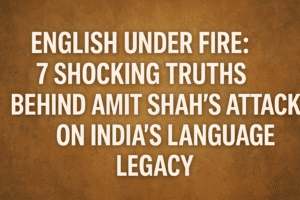English Under Fire: 7 Shocking Truths Behind Amit Shah’s Attack on India’s Language Legacy
Amit Shah’s call for shaming English speakers fundamentally contradicts India’s constitutional framework, which explicitly sanctions English in Parliament (Article 120), courts, and legislation (Article 348). Historically, figures central to India’s identity – like Gandhi, whose transformative encounter with the Bhagavad Gita came via an English translation, and Tagore, who reached global audiences through English – demonstrate how foreign languages transmitted Indian cultural treasures.
Maulana Azad pragmatically acknowledged English’s role in unifying post-independence India, akin to Persian under the Mughals. Vilifying English ignores its function as a neutral link language across diverse regions and handicaps India’s global engagement. True pluralism requires robust promotion of Indian languages alongside recognizing English’s practical and historical contributions, rejecting divisive rhetoric that betrays India’s essence of assimilation. The Constitution itself embodies this multilingual reality.

English Under Fire: 7 Shocking Truths Behind Amit Shah’s Attack on India’s Language Legacy
Amit Shah’s recent declaration—that within our lifetime, English speakers in India will “feel ashamed”—ignited predictable political firestorms. But reducing this complex issue to partisan soundbites does a grave disservice to India’s rich linguistic tapestry and constitutional ethos. Shah’s statement isn’t merely controversial; it fundamentally misreads history, undermines constitutional pragmatism, and betrays the pluralist foundations he claims to champion.
The Constitutional Contradiction: Shah’s words, delivered on the Constitution’s 75th anniversary, stand in stark opposition to the document’s spirit and letter. The Constitution itself is a polyglot marvel:
- Article 120: Explicitly permits MPs to use Hindi, English, or their mother tongue in Parliament.
- Article 348: Mandates English for Supreme Court/HC proceedings and authoritative legal texts.
- Preamble & Amendments: Originally drafted in English, with Hindi translations provided.
To suggest shame for using a language woven into the nation’s highest legal framework isn’t just rhetoric; it flirts with contempt for the constitutional machinery it purports to celebrate. If the logic of linguistic “purity” holds, does Shah propose excising English from the Constitution itself?
History’s Lesson: Languages as Bridges, Not Barriers Shah asserted that understanding India’s history, culture, and Dharma is impossible in “foreign languages.” History loudly refutes this:
- Gandhi & The English Gita: Mahatma Gandhi’s transformative encounter with the Bhagavad Gita wasn’t in Sanskrit, but through Edwin Arnold’s English translation, The Song Celestial, in London. This “foreign” rendering ignited the spiritual core of India’s freedom struggle. Gandhi, a fierce advocate for Indian languages and master of Gujarati, also recognized English as a vital tool. In 1921, he urged youth to learn world languages, including English, to share India’s wisdom globally – like Bose, Ray, or Tagore – while never neglecting their mother tongues.
- Tagore’s Global Voice: Rabindranath Tagore, India’s first Nobel laureate, had no formal English education. Yet, his profound essays in English (like Nationalism) and his own translations of his Bengali work (including Gitanjali) became conduits for Indian thought to captivate the world. His genius transcended language; it wasn’t diminished by English, but amplified through it.
- Azad’s Pragmatic Vision: Maulana Azad, a scholar of Arabic and Persian, acknowledged English’s complex legacy. He noted its unifying power: “The greatest advantage… was that many obstacles were automatically removed from our newly born national life. It led to the unification of the whole country… English played the same part… as did Persian in Mughal times.” Azad advocated for Indian languages’ rightful place but understood English’s historical and practical role in binding a diverse nation.
Pluralism vs. Parochialism: The Real Stakes The danger in Shah’s rhetoric isn’t advocacy for Indian languages – which is essential and laudable – but the framing of language as a zero-sum game demanding shame. This approach:
- Threatens Unity: English functions, however imperfectly, as a politically neutral link language across India’s dizzying linguistic diversity. Vilifying it risks alienating vast regions, particularly the South and North-East, where it’s a crucial shield against perceived Hindi imposition.
- Ignores Global Reality: English remains the primary language of global science, technology, diplomacy, and commerce. Shaming its use handicaps India’s youth and its ambitions on the world stage.
- Betrays True Pluralism: India’s civilizational strength lies in assimilation and adaptation. Persian, Arabic, Portuguese – and yes, English – have all contributed vocabulary, ideas, and cultural layers. To reject this history is to embrace a narrow, exclusionary nationalism antithetical to India’s essence.
The Path Forward: Embrace “And,” Not “Or” The solution lies not in shame, but in confident multilingualism:
- Robust Promotion of Indian Languages: Invest massively in education, literature, and administrative use of all scheduled languages. Make them vibrant vehicles of modern expression.
- Pragmatic Retention of English: Recognize its constitutional role, its unifying function in a diverse democracy, and its necessity for global engagement. Ensure high-quality English education is accessible, not elitist.
- Celebrate Proficiency, Not Origin: Value mastery and expression, whether in Tamil, Hindi, English, or Santhali. A citizen fluent in their mother tongue and English or another global language is an asset, not a subject for shame.
Conclusion: Amit Shah’s call for shaming English speakers is more than an attack on a language; it’s an assault on India’s constitutional pragmatism, its historical realities of cultural transmission, and the very pluralism that defines its identity. True patriotism isn’t found in linguistic chauvinism or manufactured shame. It resides in the confidence to embrace India’s multilingual heritage fully – celebrating the power of Indian languages alongside recognizing the practical and historical role English has played in shaping modern India and connecting it to the world. The future demands amplifying all our linguistic “ornaments,” not smashing one to polish another. The Constitution, and India’s own history, show us the way.
You must be logged in to post a comment.